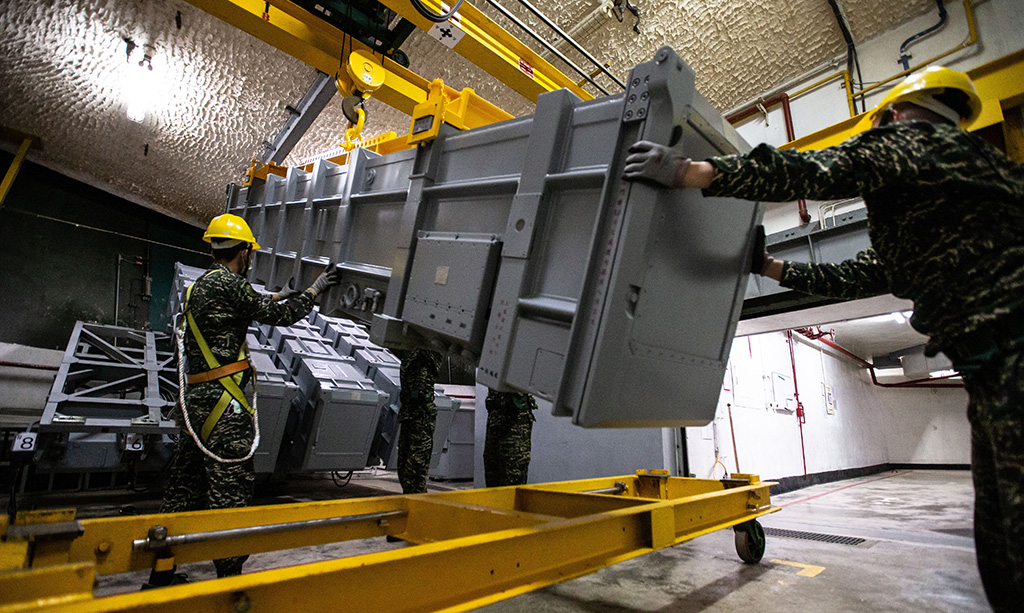BEIJING: China's largest-ever military exercises surrounding Taiwan were drawing to a close on Sunday following a controversial visit last week to the self-ruled island by US House Speaker Nancy Pelosi. Beijing has raged at the trip by Pelosi-the highest-ranking elected US official to visit Taiwan in decades-ripping up a series of talks and cooperation agreements with Washington, most notably on climate change and defence.
It has also deployed fighter jets, warships and ballistic missiles around Taiwan in what analysts have described as practice for a blockade and ultimate invasion of the island. Those exercises were set to end Sunday, though Beijing has not confirmed their conclusion.
Taiwan's transport ministry said six of the seven "temporary danger zones" China had warned airlines to avoid ceased to be in effect as of noon on Sunday, signalling a partial drawdown of the drills. It said the seventh zone, in waters east of Taiwan, would remain in effect until 10 am (0200 GMT) local time on Monday.
"Relevant flights and sailings can gradually resume," the ministry said in a statement. Taipei said some routes were still affected in the seventh area, and authorities would continue to monitor ship movements there.
Beijing has also announced fresh drills in the Yellow Sea-located between China and the Korean peninsula-to take place until August 15. Earlier on Sunday, Beijing conducted "exercises in the sea and airspace surrounding Taiwan Island as planned", the Chinese military's Eastern Command said.
Taipei's defence ministry confirmed China had dispatched "planes, vessels and drones... simulating attacks on Taiwan's main island and on ships in our waters". Beijing also sent drones over Taiwan's outlying islands, it added.
'Jeopardising' peace
In response, Taiwan said it had mobilised a "joint intelligence surveillance and reconnaissance system to closely monitor the enemy situation" as well as sending planes and vessels. Su Tseng-chang, Taiwan's premier, said China is "barbarously using military action" to disturb peace in the Taiwan Strait.
"We call on the Chinese government not to go around wielding its military power, showing its muscles everywhere and jeopardising the peace of the region," he told reporters Sunday. Taipei's foreign ministry said the drills threatened "the region and even the world".
An anonymously authored opinion piece published Sunday by state broadcaster CCTV said that after these exercises, China's military would be able to stage "regular" training drills east of the median line. That line is an unofficial demarcation in the Taiwan Strait that Beijing does not recognise.
To show how close it has got to Taiwan's shores, the Chinese military released a video of an air force pilot filming the island's coastline and mountains from his cockpit. The Eastern Command also shared a photo it said was of a warship on patrol with Taiwan's shoreline visible in the background. Ballistic missiles were also fired over Taiwan's capital during the drills, according to Chinese state media.
'A dangerous opponent'
Taiwan has remained defiant throughout China's sabre-rattling, insisting it will not be cowed by its "evil neighbour". But experts have warned the drills have revealed an increasingly emboldened Chinese military capable of carrying out a gruelling blockade of the island as well as obstructing US forces from coming to its aid.
"In some areas, the PLA might even surpass US capabilities," Grant Newsham, a researcher at the Japan Forum for Strategic Studies and a former US Navy officer, told AFP, referring to China's military by its official name. "If the battle is confined to the area right around Taiwan, today's Chinese navy is a dangerous opponent-and if the Americans and Japanese do not intervene for some reason, things would be difficult for Taiwan."
The scale and intensity of China's drills-as well as Beijing's withdrawal from key talks on climate and defence-have triggered outrage in the United States and other democracies. US Secretary of State Antony Blinken said Washington was "determined to act responsibly" to avoid a major global crisis. China should not hold talks on issues of global concern such as climate change "hostage", Blinken said, as it "doesn't punish the United States, it punishes the world". - AFP











